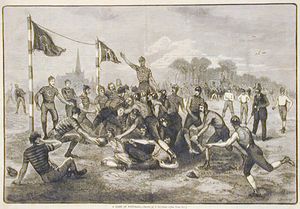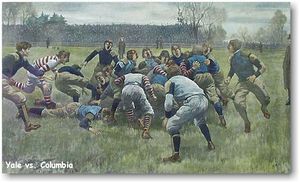Difference between revisions of "Football Team"
(→History) |
Filbert mcg (talk | contribs) |
||
| Line 1: | Line 1: | ||
| − | Columbia | + | Columbia has had five graduates on NFL rosters in the last year – more than any other Ivy school. They are: Marcellus Wiley '97, Steve Cargile '04, Jeff Otis '05, Wade Fletcher '05 and Michael Quarshie '05. |
| − | The | + | During the first half of the 20th century, the Lions enjoyed consistent success on the gridiron. Under Hall of Fame coach Lou Little, the 1934 squad shut out heavily favored Stanford in the Rose Bowl winning what was the precursor to the national championship. Little’s 1947 edition beat defending national champion Army, then riding a 32-game win streak, in one of the most stunning upsets of the century. Greats of the era included the All-American Luckman, the quarterback who would lead the Chicago Bears to four NFL championships in the 1940s while ushering football into the modern era with the T formation. |
| + | |||
| + | Since sharing their only Ivy League title with Harvard in 1961, the football Lions have enjoyed just three winning seasons (6-3 in 1971, 5-4-1 in 1994 and 8-2 in 1996). The distance of practice facilities at Baker Athletics Complex from the main campus at Morningside Heights, competition for the attention of the student body with all the diversions that Manhattan has to offer, and the lack of a winning tradition sometimes are cited as challenges to recruiting at Columbia. Norries Wilson, a runner-up for national assistant coach of the year while at the University of Connecticut in 2004, is the latest head coach brought in to try to turn the program around. The vastly improved 2006 squad notched a 5-5 campaign (the program's first .500-or-better season in 10 years), with two victories to close out the year against Cornell and Brown. Wilson, along with his staff, have restored pride in the Columbia Football program and, by all indications, have the proverbial ship pointed in the right direction. | ||
| + | |||
| + | A bright spot in recent Columbia football history has been the Liberty Cup. Dedicated in 2002, the annual competition with crosstown rival Fordham University has proved popular among students at both schools, the only Division I-AA programs in New York. Columbia leads the series, 3-2. | ||
==Facilities== | ==Facilities== | ||
Revision as of 20:50, 14 April 2007
Columbia has had five graduates on NFL rosters in the last year – more than any other Ivy school. They are: Marcellus Wiley '97, Steve Cargile '04, Jeff Otis '05, Wade Fletcher '05 and Michael Quarshie '05.
During the first half of the 20th century, the Lions enjoyed consistent success on the gridiron. Under Hall of Fame coach Lou Little, the 1934 squad shut out heavily favored Stanford in the Rose Bowl winning what was the precursor to the national championship. Little’s 1947 edition beat defending national champion Army, then riding a 32-game win streak, in one of the most stunning upsets of the century. Greats of the era included the All-American Luckman, the quarterback who would lead the Chicago Bears to four NFL championships in the 1940s while ushering football into the modern era with the T formation.
Since sharing their only Ivy League title with Harvard in 1961, the football Lions have enjoyed just three winning seasons (6-3 in 1971, 5-4-1 in 1994 and 8-2 in 1996). The distance of practice facilities at Baker Athletics Complex from the main campus at Morningside Heights, competition for the attention of the student body with all the diversions that Manhattan has to offer, and the lack of a winning tradition sometimes are cited as challenges to recruiting at Columbia. Norries Wilson, a runner-up for national assistant coach of the year while at the University of Connecticut in 2004, is the latest head coach brought in to try to turn the program around. The vastly improved 2006 squad notched a 5-5 campaign (the program's first .500-or-better season in 10 years), with two victories to close out the year against Cornell and Brown. Wilson, along with his staff, have restored pride in the Columbia Football program and, by all indications, have the proverbial ship pointed in the right direction.
A bright spot in recent Columbia football history has been the Liberty Cup. Dedicated in 2002, the annual competition with crosstown rival Fordham University has proved popular among students at both schools, the only Division I-AA programs in New York. Columbia leads the series, 3-2.
Facilities
The team plays its home games at the beautiful, bucolic, bilateral, urbane, multicultural, eleemosynary, yet still iconoclastic Lawrence A. Wien Stadium at Baker Field on 218th Street in the Inwood section of Manhattan.
History


Columbia has a storied football history. The first college team was organized in 1870. By the 1980s, the team was experiencing such glories as a record 44-game losing streak. The jubilation that ensued upon the end of this nightmare was possibly the largest outbreak of school spirit ever seen at Columbia.
At another illustrious moment, possibly in an effort to bolster fan enthusiasm, the players joined the Majority Coalition and beat up on some hippies during the 1968 protests.
This is not to mention the period from 1905 to 1915, when University President Nicholas Murray Butler banned the sport for being too rowdy. Recently, the administration has only tried (unwisely and unsuccessfully) to ban alcohol at games. They stopped when they realized that no one could rationally cheer for Columbia while sober.
Contrary to popular belief, the football team has occaisonally won games, most notably the 1961 Ivy League title, the 1934 Rose Bowl, and a 1947 match agains the cadets of Army who hadn't lost a game in four years.
The team has made history in other ways as well. One of the first intercollegiate football games was played between Columbia and Yale in 1872. An early Columbia-Princeton game was the first live televised sporting event.
Heavily recruited football players sometimes come back to speak at Columbia College Class Day.